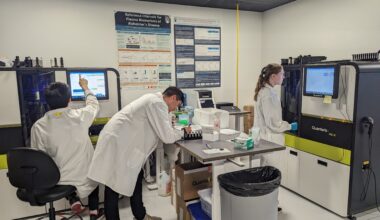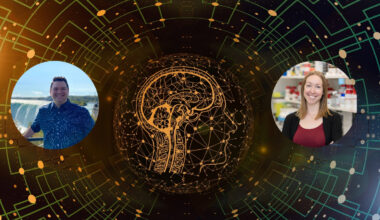Ali Mirza is working on his PhD in Dr. Helen Tremlett’s lab and is co-supervised by Dr. William Hsiao. His work is funded by the endMS Personal Award from the Multiple Sclerosis Society of Canada. We caught up with Ali to learn more about his latest research and his other hobbies outside of the lab.
What is the focus of your PhD thesis?
My project is focused on the gut microbiome in Multiple Sclerosis (MS) and my work involves the integration of computer science. I love using coding to addresses biological questions. The main question I’m looking at is what role does the gut microbiome play in MS.
The gut microbiome is a collection of trillions of microbes. Emerging research shows that the brain and immune systems which both have important implications in MS are affected by the gut microbiome. Specifically, I am using computer programs and coding to study the genetic composition of the gut microbiome.

You recently published as first author in the journal Neurology. What question was your research addressing and what did your team find out?
We wanted to understand the functional potential of the gut microbiome in pediatric onset MS, which means individuals who are diagnosed with MS before the age of 18, which is rare.
Functional potential is when we sequence microbe genes and by doing so, we can predict what they do and how prevalent they are. In other words, we’re inferring function based on what genes exist in the microbiome. By analyzing the genes of the gut microbiome in individuals with MS and those without, we can begin to understand how they differ.
We found that people with MS had more genes in the gut microbiome which are known methanogens (they produce methane gas). We know methane production may cause constipation, and people with MS have a high prevalence of constipation, so this was an interesting association.
We also looked at a group of genes associated with the lactate fermentation pathway. Lactate is a very beneficial molecule, and its production is based on our diet. We found there were fewer microbes in this pathway in people living with MS, which suggests diet might be an important part of modulating the microbiome. This is what we’re studying right now.
What do you hope to do after you graduate?
I’m very open to trying new things. I’d like to stick with research, specifically research on the gut microbiome.
What do you enjoy doing outside of the lab?
I am environmental activist—I care a lot about protecting the old growth trees in BC and finding a spiritual solution for the environmental crisis we’re facing. I also enjoy hiking with my wife and exercising with my friends.


